Abstract
1. (+)-propranolol and (±)-propranolol are comparable in their potency as a local anaesthetic on the intact and desheathed frog sciatic nerve.
2. (±)-propranolol is much more potent than (+)-propranolol as a β-receptor blocking agent and also more effective than the latter in protecting guinea-pigs against ouabain-induced ventricular fibrillation.
3. In isolated rabbit atria (-)-, (+)- and (±)-propranolol, and I.C.I. 50172, which has hardly any local anaesthetic activity, greatly reduce the rate of rise of the intracellularly recorded action potential at concentrations which have no significant effect on electrical threshold, contractions, spontaneous frequency, maximum driving frequency, repolarization time or conduction velocity.
Full text
PDF
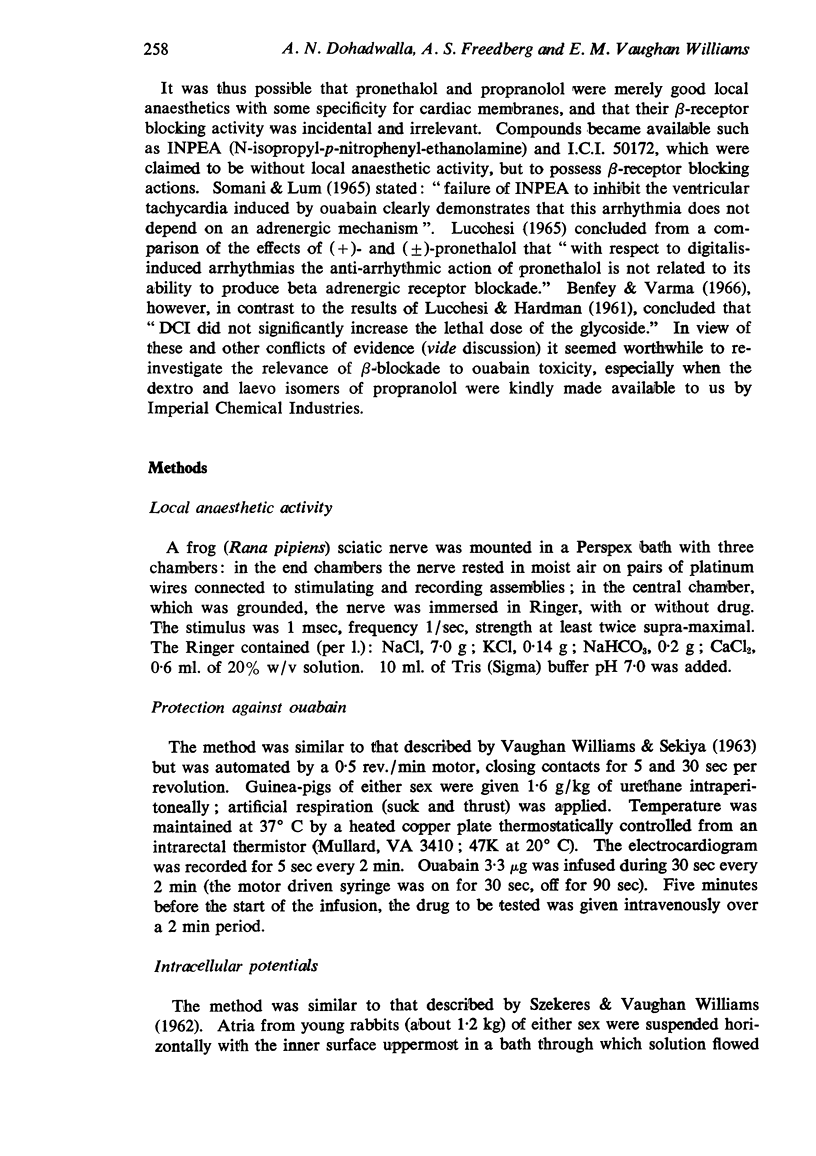


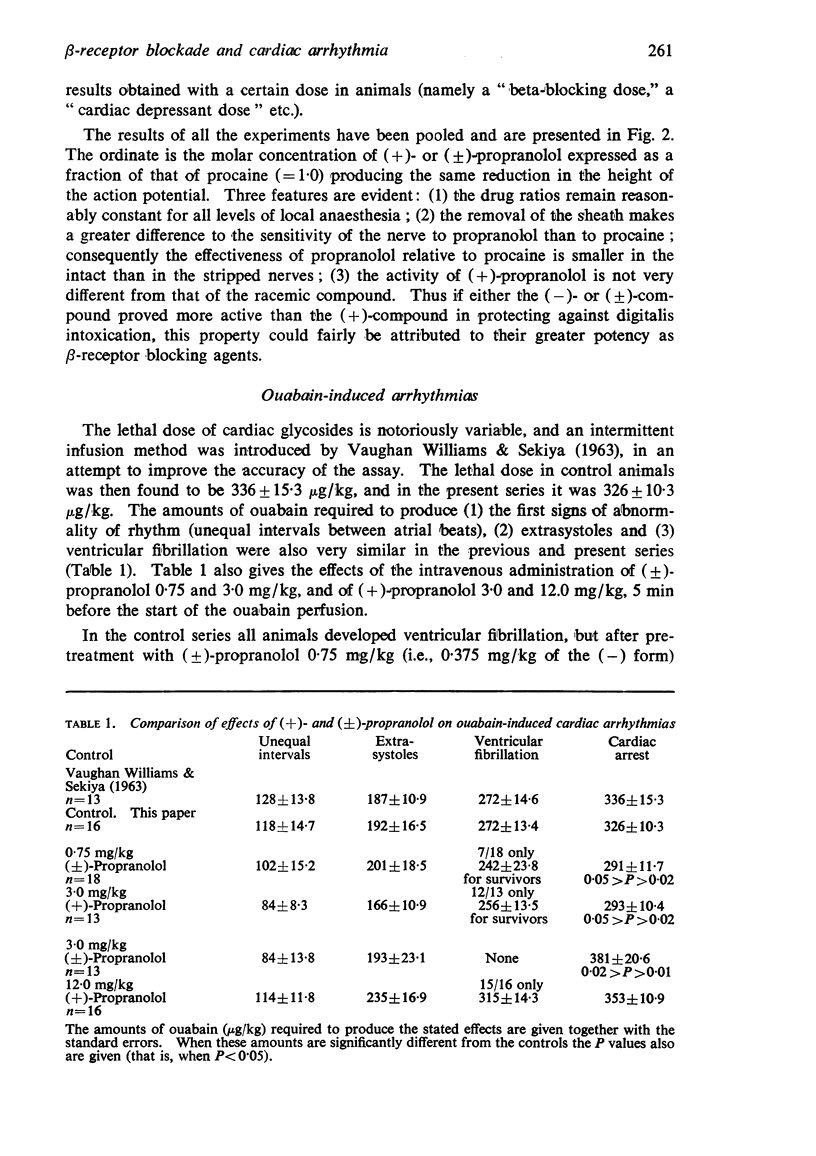


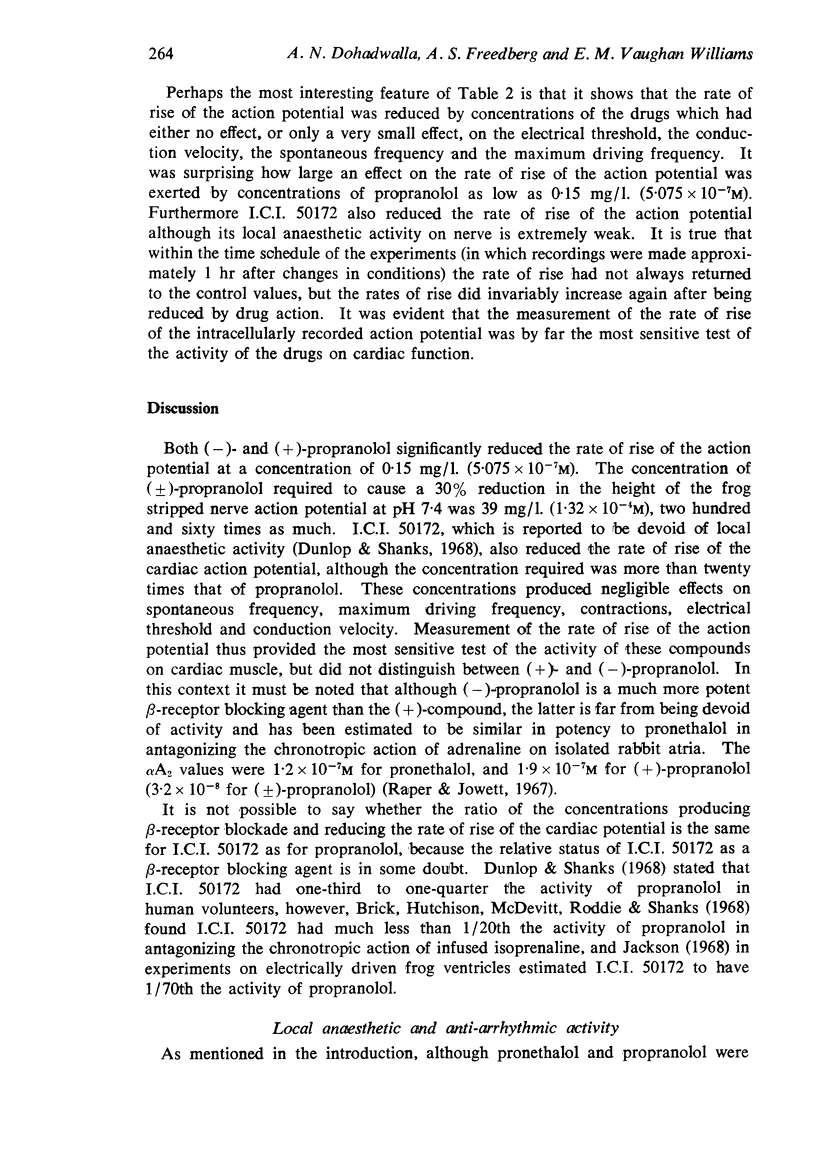
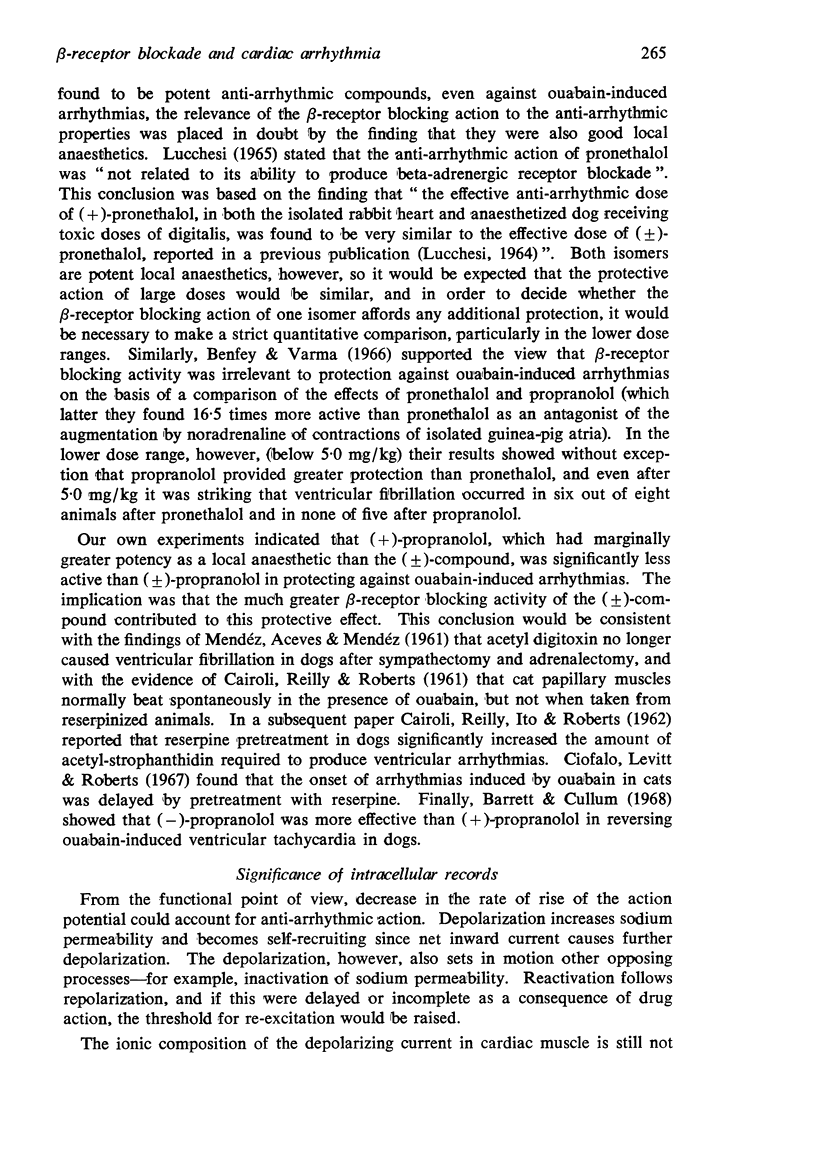

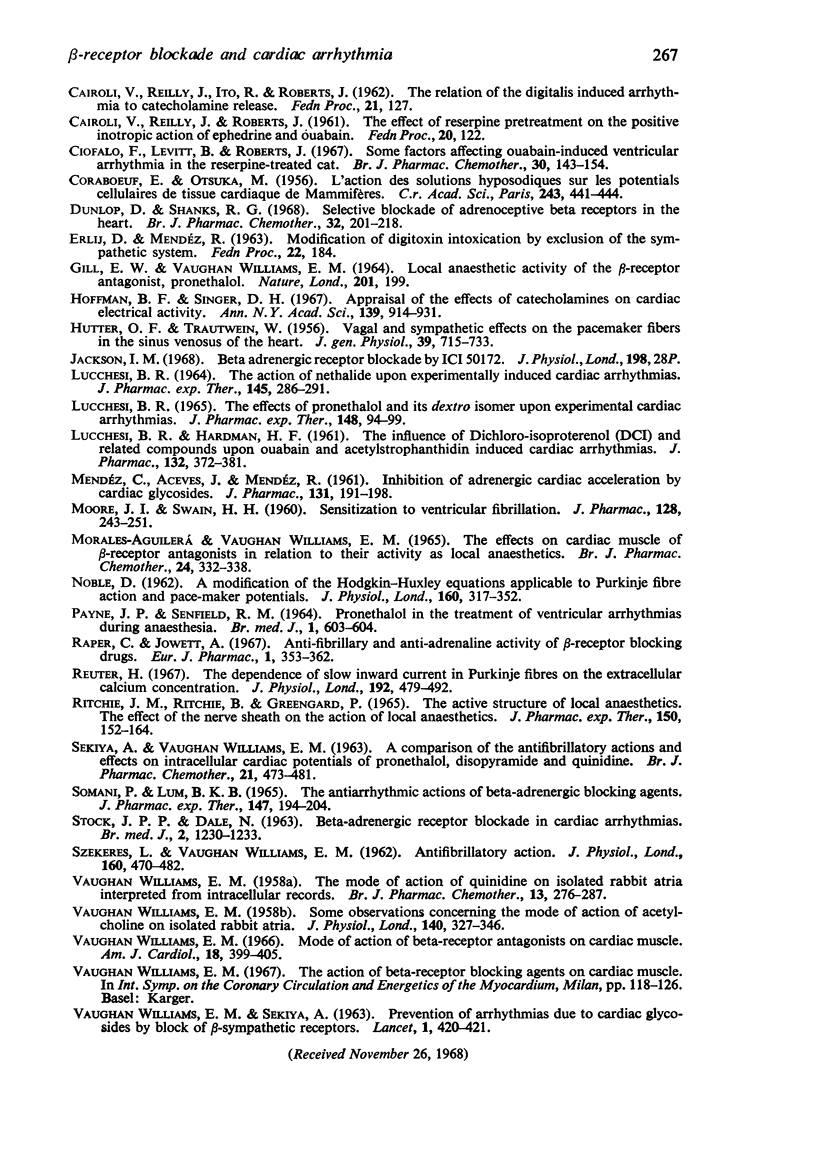
Selected References
These references are in PubMed. This may not be the complete list of references from this article.
- BLACK J. W., STEPHENSON J. S. Pharmacology of a new adrenergic beta-receptor-blocking compound (Nethalide). Lancet. 1962 Aug 18;2(7251):311–314. doi: 10.1016/s0140-6736(62)90103-4. [DOI] [PubMed] [Google Scholar]
- Benfey B. G., Varma D. R. Antisympathomimetic and antifibrillatory effects of pronethalol and propranolol. Br J Pharmacol Chemother. 1966 Jan;26(1):3–8. doi: 10.1111/j.1476-5381.1966.tb01804.x. [DOI] [PMC free article] [PubMed] [Google Scholar]
- Brick I., Hutchison K. J., McDevitt D. G., Roddie I. C., Shanks R. G. Comparison of the effects of I.C.I. 50172 and propranolol on the cardiovascular responses to adrenaline, isoprenaline and exercise. Br J Pharmacol. 1968 Sep;34(1):127–140. doi: 10.1111/j.1476-5381.1968.tb07956.x. [DOI] [PMC free article] [PubMed] [Google Scholar]
- CORABOEUF E., OTSUKA M. L'action des solutions hyposodiques sur les potentiels cellulaires de tissu cardiaque de mammifères. C R Hebd Seances Acad Sci. 1956 Jul 23;243(4):441–444. [PubMed] [Google Scholar]
- Ciofalo F., Levitt B., Roberts J. Some factors affecting ouabain-induced ventricular arrhythmia in the reserpine-treated cat. Br J Pharmacol Chemother. 1967 May;30(1):143–154. doi: 10.1111/j.1476-5381.1967.tb02120.x. [DOI] [PMC free article] [PubMed] [Google Scholar]
- Dunlop D., Shanks R. G. Selective blockade of adrenoceptive beta receptors in the heart. Br J Pharmacol Chemother. 1968 Jan;32(1):201–218. doi: 10.1111/j.1476-5381.1968.tb00444.x. [DOI] [PMC free article] [PubMed] [Google Scholar]
- GILL E. W., WILLIAMS E. M. LOCAL ANAESTHETIC ACTIVITY OF THE BETA-RECEPTOR ANTAGONIST, PRONETHALOL. Nature. 1964 Jan 11;201:199–199. doi: 10.1038/201199a0. [DOI] [PubMed] [Google Scholar]
- HUTTER O. F., TRAUTWEIN W. Vagal and sympathetic effects on the pacemaker fibers in the sinus venosus of the heart. J Gen Physiol. 1956 May 20;39(5):715–733. doi: 10.1085/jgp.39.5.715. [DOI] [PMC free article] [PubMed] [Google Scholar]
- Hoffman B. F., Singer D. H. Appraisal of the effects of catecholamines on cardiac electrical activity. Ann N Y Acad Sci. 1967 Feb 10;139(3):914–939. doi: 10.1111/j.1749-6632.1967.tb41261.x. [DOI] [PubMed] [Google Scholar]
- LUCCHESI B. R., HARDMAN H. F. The influence of dichloroiso-proterenol (DCI) and related compounds upon ouabain and acetylstrophanthidin induced cardiac arrhythmias. J Pharmacol Exp Ther. 1961 Jun;132:372–381. [PubMed] [Google Scholar]
- LUCCHESI B. R. THE ACTION OF NETHALIDE UPON EXPERIMENTALLY INDUCED CARDIAC ARRHYTHMIAS. J Pharmacol Exp Ther. 1964 Sep;145:286–291. [PubMed] [Google Scholar]
- LUCCHESI B. R. THE EFFECTS OF PRONETHALOL AND ITS DEXTRO ISOMER UPON EXPERIMENTAL CARDIAC ARRHYTHMIAS. J Pharmacol Exp Ther. 1965 Apr;148:94–99. [PubMed] [Google Scholar]
- MENDEZ C., ACEVES J., MENDEZ R. Inhibition of adrenergic cardiac acceleration by cardiac glycosides. J Pharmacol Exp Ther. 1961 Feb;131:191–198. [PubMed] [Google Scholar]
- MOORE J. I., SWAIN H. H. Sensitization to ventricular fibrillation. I Sensitization by a substituted propiophenone, U-0882. J Pharmacol Exp Ther. 1960 Mar;128:243–252. [PubMed] [Google Scholar]
- MORALES AGUILERA A., VAUGHANWILLIAMS E. M. THE EFFECTS ON CARDIAC MUSCLE OF BETA-RECEPTOR ANTAGONISTS IN RELATION TO THEIR ACTIVITY AS LOCAL ANAESTHETICS. Br J Pharmacol Chemother. 1965 Apr;24:332–338. doi: 10.1111/j.1476-5381.1965.tb01719.x. [DOI] [PMC free article] [PubMed] [Google Scholar]
- NOBLE D. A modification of the Hodgkin--Huxley equations applicable to Purkinje fibre action and pace-maker potentials. J Physiol. 1962 Feb;160:317–352. doi: 10.1113/jphysiol.1962.sp006849. [DOI] [PMC free article] [PubMed] [Google Scholar]
- PAYNE J. P., SENFIELD R. M. PRONETHALOL IN TREATMENT OF VENTRICULAR ARRHYTHMIAS DURING ANAESTHESIA. Br Med J. 1964 Mar 7;1(5383):603–604. doi: 10.1136/bmj.1.5383.603. [DOI] [PMC free article] [PubMed] [Google Scholar]
- Raper C., Jowett A. Anti-fibrillary and anti-adrenaline activity of beta-receptor blocking drugs. Eur J Pharmacol. 1967 Sep;1(5):353–362. doi: 10.1016/0014-2999(67)90095-7. [DOI] [PubMed] [Google Scholar]
- Reuter H. The dependence of slow inward current in Purkinje fibres on the extracellular calcium-concentration. J Physiol. 1967 Sep;192(2):479–492. doi: 10.1113/jphysiol.1967.sp008310. [DOI] [PMC free article] [PubMed] [Google Scholar]
- Ritchie J. M., Ritchie B., Greengard P. The effect of the nerve sheath on the action of local anesthetics. J Pharmacol Exp Ther. 1965 Oct;150(1):160–164. [PubMed] [Google Scholar]
- SEKIYA A., VAUGHANWILLIAMS E. M. A COMPARISON OF THE ANTIFIBRILLATORY ACTIONS AND EFFECTS ON INTRACELLULAR CARDIAC POTENTIALS OF PRONETHALOL, DISOPYRAMIDE AND QUINIDINE. Br J Pharmacol Chemother. 1963 Dec;21:473–481. doi: 10.1111/j.1476-5381.1963.tb02015.x. [DOI] [PMC free article] [PubMed] [Google Scholar]
- SOMANI P., LUM B. K. THE ANTIARRHYTHMIC ACTIONS OF BETA ADRENERGIC BLOCKING AGENTS. J Pharmacol Exp Ther. 1965 Feb;147:194–204. [PubMed] [Google Scholar]
- STOCK J. P., DALE N. BETA-ADRENERGIC RECEPTOR BLOCKADE IN CARDIAC ARRHYTHMIAS. Br Med J. 1963 Nov 16;2(5367):1230–1233. doi: 10.1136/bmj.2.5367.1230. [DOI] [PMC free article] [PubMed] [Google Scholar]
- Szekeres L., Williams E. M. Antifibrillatory action. J Physiol. 1962 Mar;160(3):470–482. doi: 10.1113/jphysiol.1962.sp006860. [DOI] [PMC free article] [PubMed] [Google Scholar]
- VAUGHAN WILLIAMS E. M. The mode of action of quinidine on isolated rabbit atria interpreted from intracellular potential records. Br J Pharmacol Chemother. 1958 Sep;13(3):276–287. doi: 10.1111/j.1476-5381.1958.tb00903.x. [DOI] [PMC free article] [PubMed] [Google Scholar]
- WILLIAMS E. M., SEKIYA A. Prevention of arrhythmias due to cardiac glycosides by block of sympathetic beta receptors. Lancet. 1963 Feb 23;1(7278):420–421. doi: 10.1016/s0140-6736(63)92306-7. [DOI] [PubMed] [Google Scholar]
- WILLIAMS E. M. Some observations concerning the mode of action of acetylcholine in isolated rabbit atria. J Physiol. 1958 Mar 11;140(3):327–346. [PMC free article] [PubMed] [Google Scholar]
- Williams E. M. Mode of action of beta receptor antagonists on cardiac muscle. Am J Cardiol. 1966 Sep;18(3):399–405. doi: 10.1016/0002-9149(66)90062-2. [DOI] [PubMed] [Google Scholar]


